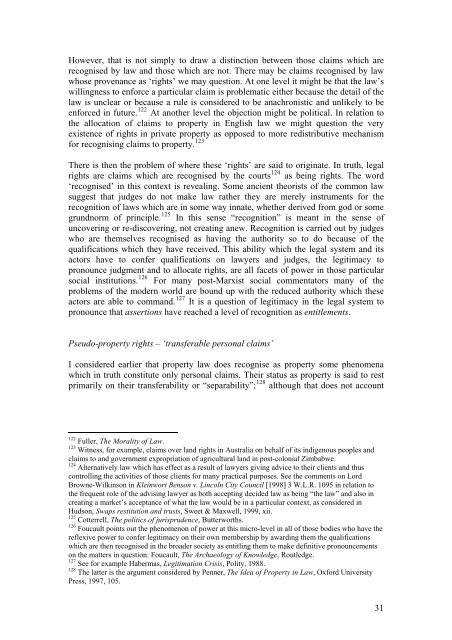The Unbearable Lightness of Property - alastairhudson.com
The Unbearable Lightness of Property - alastairhudson.com
The Unbearable Lightness of Property - alastairhudson.com
Create successful ePaper yourself
Turn your PDF publications into a flip-book with our unique Google optimized e-Paper software.
However, that is not simply to draw a distinction between those claims which are<br />
recognised by law and those which are not. <strong>The</strong>re may be claims recognised by law<br />
whose provenance as ‘rights’ we may question. At one level it might be that the law’s<br />
willingness to enforce a particular claim is problematic either because the detail <strong>of</strong> the<br />
law is unclear or because a rule is considered to be anachronistic and unlikely to be<br />
enforced in future. 122 At another level the objection might be political. In relation to<br />
the allocation <strong>of</strong> claims to property in English law we might question the very<br />
existence <strong>of</strong> rights in private property as opposed to more redistributive mechanism<br />
for recognising claims to property. 123<br />
<strong>The</strong>re is then the problem <strong>of</strong> where these ‘rights’ are said to originate. In truth, legal<br />
rights are claims which are recognised by the courts 124 as being rights. <strong>The</strong> word<br />
‘recognised’ in this context is revealing. Some ancient theorists <strong>of</strong> the <strong>com</strong>mon law<br />
suggest that judges do not make law rather they are merely instruments for the<br />
recognition <strong>of</strong> laws which are in some way innate, whether derived from god or some<br />
grundnorm <strong>of</strong> principle. 125 In this sense “recognition” is meant in the sense <strong>of</strong><br />
uncovering or re-discovering, not creating anew. Recognition is carried out by judges<br />
who are themselves recognised as having the authority so to do because <strong>of</strong> the<br />
qualifications which they have received. This ability which the legal system and its<br />
actors have to confer qualifications on lawyers and judges, the legitimacy to<br />
pronounce judgment and to allocate rights, are all facets <strong>of</strong> power in those particular<br />
social institutions. 126 For many post-Marxist social <strong>com</strong>mentators many <strong>of</strong> the<br />
problems <strong>of</strong> the modern world are bound up with the reduced authority which these<br />
actors are able to <strong>com</strong>mand. 127 It is a question <strong>of</strong> legitimacy in the legal system to<br />
pronounce that assertions have reached a level <strong>of</strong> recognition as entitlements.<br />
Pseudo-property rights – ‘transferable personal claims’<br />
I considered earlier that property law does recognise as property some phenomena<br />
which in truth constitute only personal claims. <strong>The</strong>ir status as property is said to rest<br />
primarily on their transferability or “separability”; 128 although that does not account<br />
122 Fuller, <strong>The</strong> Morality <strong>of</strong> Law.<br />
123 Witness, for example, claims over land rights in Australia on behalf <strong>of</strong> its indigenous peoples and<br />
claims to and government expropriation <strong>of</strong> agricultural land in post-colonial Zimbabwe.<br />
124 Alternatively law which has effect as a result <strong>of</strong> lawyers giving advice to their clients and thus<br />
controlling the activities <strong>of</strong> those clients for many practical purposes. See the <strong>com</strong>ments on Lord<br />
Browne-Wilkinson in Kleinwort Benson v. Lincoln City Council [1998] 3 W.L.R. 1095 in relation to<br />
the frequent role <strong>of</strong> the advising lawyer as both accepting decided law as being “the law” and also in<br />
creating a market’s acceptance <strong>of</strong> what the law would be in a particular context, as considered in<br />
Hudson, Swaps restitution and trusts, Sweet & Maxwell, 1999, xii.<br />
125 Cotterrell, <strong>The</strong> politics <strong>of</strong> jurisprudence, Butterworths.<br />
126 Foucault points out the phenomenon <strong>of</strong> power at this micro-level in all <strong>of</strong> those bodies who have the<br />
reflexive power to confer legitimacy on their own membership by awarding them the qualifications<br />
which are then recognised in the broader society as entitling them to make definitive pronouncements<br />
on the matters in question: Foucault, <strong>The</strong> Archaeology <strong>of</strong> Knowledge, Routledge.<br />
127 See for example Habermas, Legitimation Crisis, Polity, 1988.<br />
128 <strong>The</strong> latter is the argument considered by Penner, <strong>The</strong> Idea <strong>of</strong> <strong>Property</strong> in Law, Oxford University<br />
Press, 1997, 105.<br />
31













